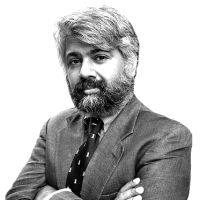When Robert de Niro was feted at a jamboree called “Think” in Goa, India, in early November—a “festival” of chattering heavyweights from the entertainment and literary world—he can hardly have imagined that his host would stand accused, three weeks later, of attempting to rape the young woman who was assigned to chaperone him and his daughter while they were guests at the gathering. As matters now stand, de Niro’s name features awkwardly (if tangentially) in the incident’s First Information Report (the Indian legal term for a “booking” for a criminal offence), and it is not inconceivable that the American movie star could be called to give evidence, or to serve as a character witness, at a trial that will rivet all of India.

In truth, India is riveted already, to such an extent that discussion of this ugly episode has swept everything else—the impending national elections, cricket, Iran, the hobbled state of the economy—right off the news bulletins. The man accused of rape is Tarun Tejpal, the host of “Think,” and one of a half-dozen of India’s most celebrated journalists. He is the editor of Tehelka (the Hindi word for “sensation”), a magazine whose forte is a muckraking brand of investigative journalism (think Ida Tarbell in modern Indian guise), especially the exposure of corruption in high places through “sting” operations. The 50-year-old Tejpal is a strapping, hirsute operator who also writes ornate novels, and who counts among his mentors Sir V.S. Naipaul, a man notoriously disinclined to bestow his approval on anyone. Most recently, he has fattened his portfolio to include “Think,” a festival now in its third year, which attracts prominent panelists from across the globe (including, most recently, Tina Brown, editor-in-chief of the Daily Beast).
Tejpal’s alleged victim is a promising reporter at Tehelka. She is in her 20s, young enough to be Tejpal’s daughter. In fact, and disconcertingly, Tejpal’s own daughter is her best friend and confidante. The victim’s name has been suppressed, as is customary in such cases. Putting at risk her job at Tehelka, she provided a graphic account of two sexual assaults she accused Tejpal of committing on consecutive days at the “Think” festival in an email to Shoma Chaudhury, Tehelka’s long-standing managing editor (i.e., Tejpal’s #2). The email was never intended to be in the public domain, but its contents have leaked and are devastating. It was this email that prompted the Goa Police to book Tejpal for rape, and if found guilty under new laws governing sexual violence that were passed by India’s parliament after the hideous gang-rape in Delhi in December last year, Tejpal faces 10 years in prison at the very minimum. His legal situation is exacerbated by the fact that he was in a “position of trust and authority,” and could exert “dominance and control” over an employee at work.
Why is this story dominating the Indian news media? The most obvious reason is the identity of the accused. Tejpal is at the moral heart of the Indian elite, a man who has given his last 10 years to a (sometimes gaudy) fight against everything that is insufferable in India, and that includes sexual violence. In February of this year, the magazine produced a special issue on sexual violence with an electrifying cover. “I Am Every Woman,” it said, and Tehelka was widely lauded for its pugnacity. This right-on man is now accused of rape, and the news has come to everyone in the media—friends, colleagues, and competitors—as a tectonic jolt. (A nation accustomed to Tejpal the Crusader is stunned.)
“What made Tejpal do this?” everyone asks. Some answers suggest themselves, the most unsettling of which is that, for all his rhetoric in the cause of women, Tejpal is, perhaps, just another unreconstructed, predatory Indian male who was playing the part of PC editor for commercial effect. A more complex explanation might be that his assault on his young reporter was the result of self-loathing: The “Think” festival in Goa is an ambitious affair, of a piece with Tejpal’s growing sense of himself as a media entrepreneur who has outgrown the relatively modest confines of Tehelka. To bankroll his new dimensions, the once-crusading editor has to go cap in hand to sponsors, some reportedly rather unsavory, with questionable civic records. This, surely, has had a corrosive effect on Tejpal and his self-image. None of this explains attempted rape, but it could explain the astonishing absence of moral guardrails and the alleged exercise of dominance as salve. I’ve begged from the powerful, now I’ll take from the vulnerable.
The second reason why the story has enveloped India in a fog of dismay is the nature of the response at Tehelka to the victim’s anguished complaint to Shoma Chaudhury, its managing editor. I am not privy to what happened, but it is clear that the latter quickly contacted Tejpal, after which the two sought to minimize the damage by private treaty. Tejpal sent Chaudhury a formal letter: “A bad lapse of judgment,” he wrote, “an awful misreading of the situation, have led to an unfortunate incident that rails against all we believe in and fight for.” Continuing in the purple prose that attained national notoriety the moment it was made public, he declared, “Because it involves Tehelka, and a sterling shared legacy, I feel atonement cannot be just words. I must do the penance that lacerates me. I am therefore offering to recuse myself from the editorship of Tehelka, and from the Tehelka office, for the next six months.” Chaudhury, one of India’s more prominent journalists on issues surrounding the condition of women, appended this morally cocksure letter from her boss to her own managerial email to Tehelka’s staff, in which she broke the news of Tejpal’s “recusal,” it being the result, she said, of an “untoward incident.”
All these words—“lapse of judgment,” “awful misreading of the situation,” “unfortunate incident,” “atonement,” “penance,” “recuse”—so glib, so euphemistic, so mealy-mouthed, went viral. “Rails” and “lacerate,” two other words swiftly elected for pillory, were classic Tejpal, overblown, mannered, theatrical. And as it became apparent, first on Twitter, later in the mainstream media, that the matter was one of sexual assault, this flock of words came to be seen as proof of an editor’s nonchalance, his presumptuousness, and his sense of entitlement—not merely to a woman’s body, as is alleged, but to the right to levy his own punishment on himself, a mere six-month’s sabbatical for actions that carried a penalty of significant jail-time in the world outside Tehelka.
Shoma Chaudhury’s compliance in this game of apparent victim-diminishment also came in for heavy strafing, especially from outraged fellow feminists. Questions were hurled at her like poisoned arrows: How could she, a doughty, feminist journalist, have allowed herself to describe what is alleged to have happened as a mere “untoward incident”? How could she have allowed herself to whitewash such monstrosity? Granted Tejpal and Chaudhuri are intensely close colleagues, comrades-in-arms over many a Tehelka battle: But how could she have allowed that history to blind her to the plight of a distraught young woman who had come to her for help?
In the end, was it his verbiage that damned Tejpal? Actions speak louder than words, it is said; but here, words spoke just as loudly as actions. If Tejpal is found guilty, it will be because of what he is alleged to have inflicted on a young woman against her will in an elevator in Goa. But it will also be because of the verbal assuaging of his conscience. He thought he could talk his way out of a charge of rape. The hubris of his words was unpardonable.






